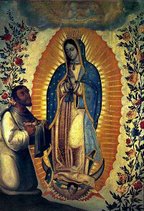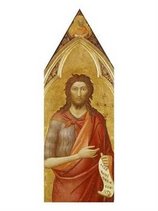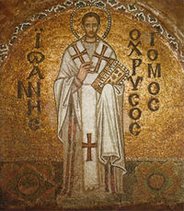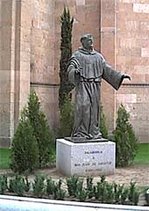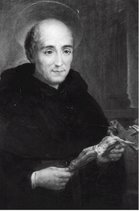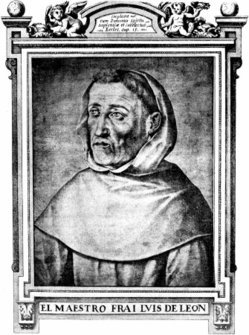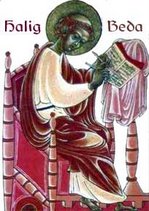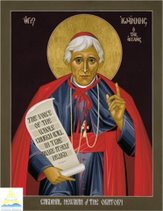His Holines Bartholomew I Ecumenical Patriarch of Constantinople

Here are some links to content on the official website for the Patriarchate of Constantinople:
Address to Pope Benedict
Biography of Bartholomew I
"Dilige et quod vis fac." -St. Augustine from the 7th Sermon on the First Letter of St. John.

Here are some links to content on the official website for the Patriarchate of Constantinople:
Address to Pope Benedict
Biography of Bartholomew I
Posted by
Antonio449
at
8:01 PM
0
comments
![]()
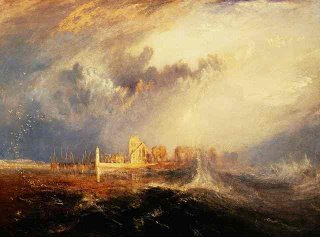
Here is a money post at Compostela, the blog of a Classics professor from Castilla teaching at Santiago de Compostela in Galicia, in Northwest Spain. Here is my attempt at a translation into English:
I, watercolorist
I will never be a poet, a novelist, a painter or a photographer,
I couldn't be a watercolorist even though I'd like to be.
And I have things to paint: this morning I could have painted mount Pedroso, and in the background, the red color of the clouds. I would have tried to capture the tone of the light: What was it? Red? Ocre? Or something in between?
On the way to the Department of Philosophy and towards my own I kept on seeing frameable pictures: the oaks near Saint Claire, the garden of Bonaval from Saint Rocco, Mazarelos square, the high wall with symmetric windows on Val de Dios lane, and the row of liquidámbares (how happy I am to know that name!) behind Mayor Xelmírez College.
But I can only be a writer on a blog. How great it is to have found the limit of my incompetence! Maybe watercolors are only artistic stubs one places in petite bourgeois living rooms, until they are destroyed by the mercy of time.
Posted by
Antonio449
at
5:40 AM
0
comments
![]()
Francisco de Quevedo y Villegas (1580-1645)
Money and Poverty
The truth is bitter, so I spit it out
And if such bitterness touches your soul
it’s foolish to hide it.
So let everyone know
That too much liberality
Has caused me to be lazy.
Poverty
Who can make a Romeo out of a one-eyed man
And a prudent gent from a dunce?
Who is like the River Jordan for a rich, greedy old man?
Who can turn stones to bread
And is not the One True God?
Money
Who frightens the King’s scepter and crown with his ferocity?
Who without having religion.
Deserves the name of a saint?
Who raises his head to the heavens with humility?
Poverty
Who makes passionate judges humane without being ointment
For anointing their hands, it lightens their hearts?
Who makes make-up with gold and not with steal?
Money
Who strives to wipe vainglory off the face of the earth?
Who being entirely Christian
Has the face of a heretic?
Who makes hatred and sadness complaints to man?
Poverty
Who brings together mountains and valleys
The Pretty Girl and the Ugly Man?
Who could conceive any desire, however impossible?
Who could easily raise up what was once downcast?
Money
Spanish original:
Pues amarga la verdad,
Quiero echarla de la boca;
Y si al alma su hiel toca,
Esconderla es necedad.
Sépase, pues libertad
Ha engendrado en mi pereza
La Pobreza.
¿Quién hace al tuerto galán
Y prudente al sin consejo?
¿Quién al avariento viejo
Le sirve de Río Jordán?
¿Quién hace de piedras pan,
Sin ser el Dios verdadero
El Dinero.
¿Quién con su fiereza espanta
El Cetro y Corona al Rey?
¿Quién, careciendo de ley,
Merece nombre de Santa?
¿Quién con la humildad levanta
A los cielos la cabeza?
La Pobreza.
¿Quién los jueces con pasión,
Sin ser ungüento, hace humanos,
Pues untándolos las manos
Los ablanda el corazón?
¿Quién gasta su opilación
Con oro y no con acero?
El Dinero.
¿Quién procura que se aleje
Del suelo la gloria vana?
¿Quién siendo toda Cristiana,
Tiene la cara de hereje?
¿Quién hace que al hombre aqueje
El desprecio y la tristeza?
La Pobreza.
Posted by
Antonio449
at
1:44 PM
0
comments
![]()
From El Criticón, Baltasar Gracián
CRISI NONA. Moral anatomía del Hombre
Eternizaron con letras de oro los antiguos en las paredes de Delfos, y mucho más con caracteres de estimación en los ánimos de los sabios, aquel célebre sentimiento de Biante: Conócete a ti mismo. Ninguna de todas las cosas criadas yerra su fin, sino el hombre; él sólo desatina, ocasionándole este achaque la misma nobleza de su albedrío.
The Ancients eternalized that famous sentiment of Biante with golden letters on the walls of Delphos and much more so on the souls of the wise: Know thyself. None of creation errs in its end save for man, only he mistakes it, the nobility of his own will causing him this injury.
So because of our own impetuous will we often do things out of caprice that make a joke of our humanity. We don't want limits, we want to be gods, you know. But man is not a god. And even if we will God's death and try to absorb his power we just end up destroying our own humanity in the process. Enter the gene factory. (i.e.Never underestimate our ability to make complet monsters of ourselves.) Notice that in contemporary society you never hear talk of the final end of man as such. What is man and what is his purpose? These questions are never even answered not to mention addressed.
CRISI DÉCIMA. El mal paso del salteo
Vulgar desorden es entre los hombres hacer (de los fines) medios y de los medios hacer fines: lo que ha de ser de paso toman de asiento y del camino hacen descanso; comienzan por donde han de acabar, y acaban por el principio.
A common disorder among men is to make means of ends and ends of means. What should be passing they take for permanent. What should be on-going they take for settled. They start where they should have ended and end whence they should have begun.
Now in order to make something a complete and utter waste of time there's nothing better than taking it as the end all and be all without reference to a final purpose or goal. Now you've not only destroyed the thing you thought you valued you've rendered the world utter meaningless as such.
Posted by
Antonio449
at
7:20 PM
0
comments
![]()
Particles in Singlish are highly comparable to Chinese. In general, discourse particles occur at the end of a sentence. Their presence changes the meaning or the tone of the sentence, but not its grammaticality.
Particles are noted for keeping their tones regardless of the remainder of the sentence. Most of the particles are directly borrowed from southern Chinese varieties, with the tones intact.
The ubiquitous word lah (/lɑ́/ or /lɑ̂/) is used at the end of a sentence. Lim (2004) describes it as a particle that simultaneously asserts a position and entices solidarity.
Note that 'lah' is often written after a comma for clarity, but there is never a pause before a lah. This is because in the original Malay, 'lah' is appended to the end of the word and is not a separate word by itself.
In Malay, 'lah' is used to change a verb into a command or to soften its tone, particularly when usage of the verb may seem impolite. To drink is minum, but 'Here, drink!' is "minumlah!". Similarly, 'lah' is frequently used with imperatives in Singlish:
'Lah' also occurs frequently with "Yah" and "No" (hence "Yah lah" and "No lah"). The results sound less brusque and facilitate the flow of conversation.
Lah is often used with brusque, short, negative responses:
Lah is also used for reassurance:
Lah can also be used to emphasize items in a spoken list, appearing after each item in the list.
Posted by
Antonio449
at
8:11 PM
0
comments
![]()
Posted by
Antonio449
at
11:24 AM
0
comments
![]()
Posted by
Antonio449
at
10:53 AM
0
comments
![]()
(From the Second Volume of Democracy in America)
Chapter XII
WHY SOME AMERICANS MANIFEST A SORT OF FANATICAL SPIRITUALISM
Although the desire of acquiring the good things of this world is the prevailing passion of the American people, certain momentary outbreaks occur when their souls seem suddenly to burst the bonds of matter by which they are restrained and to soar impetuously towards heaven. In all the states of the Union, but especially in the half-peopled country of the Far West, itinerant preachers may be met with who hawk about the word of God from place to place. Whole families, old men, women, and children, cross rough passes and untrodden wilds, coming from a great distance, to join a camp-meeting, where, in listening to these discourses, they totally forget for several days and nights the cares of business and even the most urgent wants of the body.
Here and there in the midst of American society you meet with men full of a fanatical and almost wild spiritualism, which hardly exists in Europe. From time to time strange sects arise which en- deavor to strike out extraordinary paths to eternal happiness. Religious insanity is very common in the United States.
Nor ought these facts to surprise us. It was not man who implanted in himself the taste for what is infinite and the love of what is immortal; these lofty instincts are not the offspring of his capricious will; their steadfast foundation is fixed in human nature, and they exist in spite of his efforts. He may cross and distort them; destroy them he cannot.
The soul has wants which must be satisfied; and whatever pains are taken to divert it from itself, it soon grows weary, restless, and disquieted amid the enjoyments of sense. If ever the faculties of the great majority of mankind were exclusively bent upon the pursuit of material objects, it might be anticipated that an amazing reaction would take place in the souls of some men. They would drift at large in the world of spirits, for fear of remaining shackled by the close bondage of the body.
One of the great errors of the recent past was the assumption, the grand mistake of both capitalism and communism, that man can live on bread alone. During the Cold War religion while used as a tool for anti-communist actions such as can be seen in Poland and Afghanistan, was not taken seriously as a force in itself worthy of respect. Whenever man is forced to believe that "it's all money and whores" something inside him is wounded and his heart is eaten away with a special hollowness. For if there is not a greater end than mere accumulative and technological means and know how, human life is ultimately meaningless. Some violent reactions will result as can be seen by events since 1979 with the fall of the Shah in Iran and the rise of Jihadism and all the consequences we are seeing now. Not to mention the peculiar phenomena found in Christian sects in the United States that De Tocqueville describes. All is directed against the Technochratic assumptions of the West, and the interior turmoil of the Muslim World.
By voting for the Democrats last Tuesday we Americans were not in effect endorsing the secularist agenda but assumed that the Dems were smart enough not to ignore the emminent threats facing our country and the West in general.
Posted by
Antonio449
at
4:54 PM
0
comments
![]()
De Tocqueville explains the general tendency of Protestants to convert to Catholicism in the US and for Cradle Catholics to fall away. This same tendency is operative up to this day. As a converso (a convert from Episcopalianism) I find this interesting:
Chapter VI
THE PROGRESS OF ROMAN CATHOLICISM IN THE UNITED STATES
AMERICA is the most democratic country in the world, and it is at the same time (according to reports worthy of belief) the country in which the Roman Catholic religion makes most progress. At first sight this is surprising.
Two things must here be accurately distinguished: equality makes men want to form their own opinions; but, on the other hand, it imbues them with the taste and the idea of unity, simplicity, and impartiality in the power that governs society. Men living in democratic times are therefore very prone to shake off all religious authority; but if they consent to subject themselves to any authority of this kind, they choose at least that it should be single and uniform. Religious powers not radiating from a common center are naturally repugnant to their minds; and they almost as readily conceive that there should be no religion as that there should be several.
At the present time, more than in any preceding age, Roman Catholics are seen to lapse into infidelity, and Protestants to be converted to Roman Catholicism. If you consider Catholicism within its own organization, it seems to be losing; if you consider it from outside, it seems to be gaining. Nor is this difficult to explain. The men of our days are naturally little disposed to believe; but as soon as they have any religion, they immediately find in themselves a latent instinct that urges them unconsciously towards Catholicism. Many of the doctrines and practices of the Roman Catholic Church astonish them, but they feel a secret admiration for its discipline, and its great unity attracts them. If Catholicism could at length withdraw itself from the political animosities to which it has given rise, I have hardly any doubt but that the same spirit of the age which appears to be so opposed to it would become so favorable as to admit of its great and sudden advancement.
One of the most ordinary weaknesses of the human intellect is to seek to reconcile contrary principles and to purchase peace at the expense of logic. Thus there have ever been and will ever be men who, after having submitted some portion of their religious belief to the principle of authority, will seek to exempt several other parts of their faith from it and to keep their minds floating at random between liberty and obedience. But I am inclined to believe that the number of these thinkers will be less in democratic than in other ages, and that our posterity will tend more and more to a division into only two parts, some relinquishing Christianity entirely and others returning to the Church of Rome.
Posted by
Antonio449
at
3:41 PM
0
comments
![]()

Alexis de Tocqueville 1805-1859
Fetters and headsmen were the coarse instruments that tyranny formerly employed; but the civilization of our age has perfected despotism itself, though it seemed to have nothing to learn. Monarchs had, so to speak, materialized oppression; the democratic republics of the present day have rendered it as entirely an affair of the mind as the will which it is intended to coerce. Under the absolute sway of one man the body was attacked in order to subdue the soul; but the soul escaped the blows which were directed against it and rose proudly superior. Such is not the course adopted by tyranny in democratic republics; there the body is left free, and the soul is enslaved. The master no longer says: "You shall think as I do or you shall die"; but he says: "You are free to think differently from me and to retain your life, your property, and all that you possess; but you are henceforth a stranger among your people. You may retain your civil rights, but they will be useless to you, for you will never be chosen by your fellow citizens if you solicit their votes; and they will affect to scorn you if you ask for their esteem. You will remain among men, but you will be deprived of the rights of mankind. Your fellow creatures will shun you like an impure being; and even those who believe in your innocence will abandon you, lest they should be shunned in their turn. Go in peace! I have given you your life, but it is an existence worse than death."
(From the First Volume of Democracy in America)
Posted by
Antonio449
at
1:58 PM
2
comments
![]()
Here is another poem by Whitman which I cannot help but think has a bearing on the importance of Our Lady.
| UNFOLDED out of the folds of the woman, man comes unfolded, and is always to come unfolded; | |
| Unfolded only out of the superbest woman of the earth, is to come the superbest man of the earth; | |
| Unfolded out of the friendliest woman, is to come the friendliest man; | |
| Unfolded only out of the perfect body of a woman, can a man be form’d of perfect body; | |
| Unfolded only out of the inimitable poem of the woman, can come the poems of man—(only thence have my poems come;) | 5 |
| Unfolded out of the strong and arrogant woman I love, only thence can appear the strong and arrogant man I love; | |
| Unfolded by brawny embraces from the well-muscled woman I love, only thence come the brawny embraces of the man; | |
| Unfolded out of the folds of the woman’s brain, come all the folds of the man’s brain, duly obedient; | |
| Unfolded out of the justice of the woman, all justice is unfolded; | |
| Unfolded out of the sympathy of the woman is all sympathy: | 10 |
| A man is a great thing upon the earth, and through eternity—but every jot of the greatness of man is unfolded out of woman, | |
| First the man is shaped in the woman, he can then be shaped in himself. |
Though Whitman doubtlessly meant to celebrate women in general, But behind woman and womanhood lurks the imprint of the incarnate Son. Have you every noticed that in the Old Testament mankind is Adam (dirt), in both ish (man) and ishah (woman). Both created in the Image and likeness of God. However through original sin one becomes subject to another. Even in the Mosaic Law and the Ten Commandments the precept not to covet another's wife was meant more along the lines of property than anything else. Yet there was a seed there you see briefly in the stories of Sara, Deborah, Ruth and Naomi, and Esther. Yet only with Jesus Christ is womanhood revealed. As Antonio Machado had said in one of his pseudo-lectures as Juan Mairena- Jesus Christ is the inventor of woman. Only with the advent of Christianity as such was the concept of womanhood, and a concrete feminine genius developed.
Now with the dissolution of Christendom and Christian culture the drive for equality threatens to reduce humanity to basic maleness and femaleness which is in itself subhuman. Maleness does not make a man a man nor does femaleness make for a woman. We are tending more and more towards an androgynous state and the loss of our own humanity. Much of late tweentieth century feminism's mistake (as opposed to classical feminism earlier in the century) was to take the western ideal of autonomy which is purely masculine in nature and graft it onto femaleness, thus destroying woman. Many women know this instinctively. A woman need only abide and she is. A man must do something or make something of himself.
The current crisis of masculinity is at basis a crisis of humanity where manliness and womanliness are being trampled underfoot toward our rapid descent into animality, where unreason and brute force triumph. Only by focusing on the Immaculate Mother and Her Son can we approach humanity in full, a humanity joined with the divine life. Humanity set free to love and serve the Lord. Otherwise we're nothing more than our genitalia and our urges. Nothing more. Just hairless orangutans humping other orangutans in the city. No wonder we're so confused. Only humanity can be inhuman, and only man can be theunman and not recognize his humanity. Even my pet cockatoo in her conditioned upbringing by humans has some inkling of what a man is.
Posted by
Antonio449
at
3:06 PM
0
comments
![]()
Posted by
Antonio449
at
9:07 AM
1 comments
![]()
 Pictured above is a perkutut, a turtle dove popularly raised in Indonesia for its singing capability. Supposedly these birds came from India with the traders and the custom spread to other South-East Asian countries like Thailand. These competitions or "lomba" get pretty serious apparently. Wild stuff. Just if you're curious here is a link to a recording of one of these buggers:
Pictured above is a perkutut, a turtle dove popularly raised in Indonesia for its singing capability. Supposedly these birds came from India with the traders and the custom spread to other South-East Asian countries like Thailand. These competitions or "lomba" get pretty serious apparently. Wild stuff. Just if you're curious here is a link to a recording of one of these buggers:
Perkutut Song
Imagine waking up to that everyday!
Posted by
Antonio449
at
1:20 PM
0
comments
![]()
Posted by
Antonio449
at
7:51 PM
0
comments
![]()

"There was big controversy in my country over amount of anti-semitism in my moviefilm but the censor say there was just enough."
Of course the actor who plays Borat, Sacha Baron Cohen, is Jewish so the whole Anti-Semitism schtick is kind of insane. But whatever. Maybe it's timely since like an old hemrrhoid Anti-Semitism is raging again. The problem with Anti-Semitism and Anti-Catholicism/Anti-Clericalism for that matter is that it blocks out all rational thought. Only the obsession of hate matters. Cada loco con su tema- Every mad man has his own theme. Of interest here is a parody website International Jewish Conspiracy:http://www.internationaljewishconspiracy.com, since as they tell me the International Catholic Conspiracy has failed.
Now back to Borat. Ironcially, Kazakhstan is pretty close to Khazaria, a Medieval Jewish Kingdom that lasted until about the 11th century. Somewhere along the line the kings converted to Judaism and that became the official religion. Yehuda-Ha-Levi the Sephardic poet and scholar wrote a treatise Al-Kuzari in which he has a dispute about the Truth of Judaism in the mouth of a Khazari Rabbi. As it turns out there is a legend that the Khazaris were approached by both Muslims and Christians each asking them to convert to their religion. When asked about the Books of Moses both affirmed that they were inspired so the King decided to adopt Judaism, since all things being equal both the Muslims and the Christians claimed the Jewish religion had authority at least at one time or another.
Posted by
Antonio449
at
11:47 AM
0
comments
![]()
